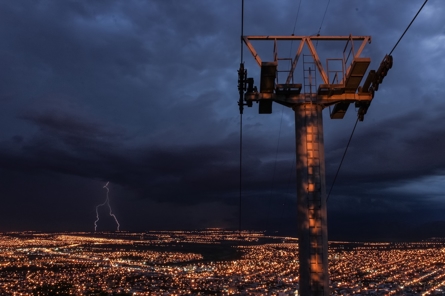
One of the most common issues residents face during a severe storm is a community-wide power outage. When this happens, a backup generator could be your only source of power. A generator can allow you to recharge your phones to call friends, family and emergency services, plus power your air conditioning or fridge to sustain you until the storm passes. Find out everything you should know about using your generator for emergency home use with tips from ServiceMaster Restore®.
The Importance of Generator Safety
It's essential that you use your generator in the proper manner. In fact, if they aren't used correctly, you run the risk of producing excess amounts of carbon monoxide. Carbon monoxide poisoning can lead to sickness, hospitalization or even death. According to the Centers for Disease Control (CDC), gasoline-powered generators are one of the most common sources of accidental carbon monoxide poisoning after a power outage occurs. That's why it's crucial for you to understand how to properly use this machine to keep your home and family safe.
How to Use Your Generator
Before you plan to use a backup generator, it's recommended that you read the manufacturer-provided manual to fully understand the correct way to set up and operate the machine. Then, follow these tips to ensure you're using your generator safely:
- Teach your children proper emergency preparedness tips and generator safety.
- Never run a generator inside of the home or in a closed garage.
- Always use generators at least ten feet from your home.
- Make sure your generator has enough fuel to hold you over until power can be restored.
- Keep extra fuel in a separate, safety-approved container.
- Drain old fuel from the generator and let it fully cool before adding new fuel.
- Test out your generator before storm season begins so you can be sure it's working properly.
- Buy a battery-operated carbon monoxide alarm to detect levels when your generator is turned on.
- Use dry hands to turn your generator on.
- Use an outdoor-rated extension cord to power your essential appliances.
Powering Essential Appliances
The amount of energy your generator puts out depends on its size and how many watts of power it can produce. Regardless of the size of your particular generator, there are certain appliances that you should consider powering up over others:
- The refrigerator. To have a reserve of food and water that won't spoil, power up your fridge. This is especially important if you know the power will be out for more than a few hours.
- Sump pumps. If you use a sump pump, this crucial item should also maintain its power to pump water out, even if you're without electricity.
- Microwaves. Depending on the wattage output of your generator, a full-size oven or microwave should also have power so you can warm up food, especially if your power will be out for days on end.
- Lights. Lastly, use your backup generator to provide power to a few lights in the home.
- Window AC units. Stronger generators can even power a window AC unit, allowing you to stay cool and comfortable even when the power goes out.
During hurricane season, generators can help you maintain a sense of normalcy when the electricity goes out. If you've experienced serious damage to your property as a result of a hurricane or storm, let the experts at ServiceMaster Restore assist you with cleanup and recovery. We're here to help you 24 hours a day, and our professionals are happy to answer any questions you have about storm-related damage. Our goal is to make sure you and your family can return to a clean, normal home as soon as possible after the storm has passed.


